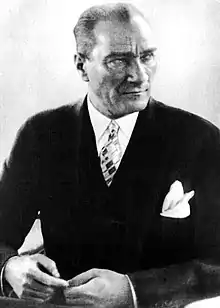Atatürk International Peace Prize
The Atatürk International Peace Prize (Turkish: Atatürk Uluslararası Barış Ödülü) is an award delivered since 1986 to award real people and organizations who have made memorable contributions to world peace in accordance of Kemal Atatürk's quotation, "Peace at Home, Peace in the World".[1] It has been created during the presidency of coup leader Kenan Evren,[2] by the Atatürk Association for Culture Language and History.[3] The award is to be awarded to candidates nominated by members of non-governmental organizations, the Senate of Turkish universities and also the Secretary Generals of the United Nations and the Organization of Islamic Cooperation. The President of Turkey as well as the speaker of the Grand National Assembly of Turkey can also present candidates.[1] After the prize was not awarded for 13 years after 2000, in 2013 it was decided to award it only every five years.[4] An award was to be given in 2015,[4][5] but was no ceremony is documented. The next award is planned to be given in 2020.[1]
| Year | Laureate | Comments |
|---|---|---|
| 1986 | Joseph Luns, the secretary general of the NATO | |
| 1987 | Richard von Weizsäcker, the president of Germany | |
| 1989 | Takahito Mikasa, Japanese prince and academic | In he was awarded he mentioned that world peace can only be gained after the poverty will be abolished[6] |
| 1990 | Kenan Evren, the President of Turkey | That Kenan Evren was awarded with the prize is seen by some as the reason for why Nelson Mandela has not accepted the prize.[4] |
| 1992 | Nelson Mandela, the president of South Africa | Nelson Mandela created an uproar in Turkish society as he has not accepted the prize. Following this decline to accept the prize, the news paper Hürryet published an issue with the headline Ugly African Turkish: Çirkin Afrikalı)[7] |
| 1995 | Turkish Red Crescent, a Turkish NGO | |
| 1996 | UNICEF, the children emergency fund of the United Nations | |
| 1997 | Stabilisation Force in Bosnia and Herzegovina, a peacekeeping force of the NATO | For their achievements in maintaining peace in Bosnia and Herzegovina |
| 1999 | Heydar Aliyev, the president of Azerbaijan | Several of his policies were inspired by Atatürk[8] |
| 2000 | Rauf Denktaş, the president of the Turkish Republic of Northern Cyprus | |
| 2002 | Bernard Lewis, a researcher at the Princeton University | Bernard Lewis was awarded on grounds that he contributed extensively to history scholarship with his accurate analysis of Turkey’s and in particular of Atatürk’s positive impact on Middle Eastern history.[9] |
| ||
|---|---|---|
|
Family and relatives
|
||
References
- "ATATÜRK INTERNATIONAL PEACE PRIZE PRESS RELEASE – AYK". www.ayk.gov.tr. Retrieved 2020-06-25.
- "Former Turkish President Evren dies". BBC News. 2015-05-09. Retrieved 2020-06-25.
- Turkey Today. Turkish Embassy. 1989. p. 4.
- "'Atatürk Barış Ödülü' 2015'te yeniden verilecek". Sabah (in Turkish). Retrieved 2020-06-25.
- "Atatürk International Peace Prize".
- "Japan's Takahito Mikasa at 100: A Prince Among the Jews". Tablet Magazine. 2015-12-02. Retrieved 2020-06-25.
- "Hürriyet'in Mandela çarkı". Sabah (in Turkish). Retrieved 2020-06-25.
- "Atatürk Center in Azerbaijan". Hürriyet Daily News. Retrieved 2020-06-25.
- http://www.ataturksociety.org/ataturk-awards/
